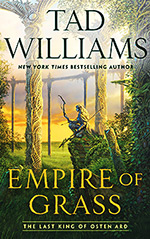
![]() Naomi_uk72
Naomi_uk72
6/21/2019
![]()
It's taken me a while to get through this book, though that's not an indication of it being bad in any way. Mostly the slow pace has been down to not spending as much time reading as I normally would, but there's also a hell of a lot going on in this book that really does require that the reader pays attention. It's this level of detail, this level of engagement with the characters, that makes this an excellent mid-trilogy piece.
I make no secret of the fact that I love Tad Williams' Osten Ard books. The first trilogy, Memory, Sorrow and Thorn, is amongst my favourite all-time fantasy series and when The Heart of What Was Lost and The Witchwood Crown came out I was excited to see a return to the wonderfully realised land they're set in. Those two titles didn't disappoint, with The Heart of What Was Lost bridging the gap between the first and second trilogies nicely, and The Witchwood Crown providing an exhilarating start to the new trilogy. Empire of Grass builds on the foundation laid so perfectly by the previous book and it builds both high and wide.
As I mentioned above, there's a lot going on in this book. There are several disparate character points of view to keep up with, as well as the various machinations of the different factions involved. The Nabbanai fight the Thrithingsmen who fight the Hernystiri who plot against the Erkynlanders who fight the Norns who fight the Sidhi and so on until it's all but impossible to keep track of who's stabbing who in the back. Yet despite the complexity and obfuscation Williams draws us through every twist and turn like a veteran guide, showing us exactly what we need to see in order to understand the lie of the land around us. Little details that seem superfluous in one chapter come back and haunt us later in the narrative, and yet by the end of the book there are still many questions left unanswered.
Because this is the second book in a trilogy it does end on a cliff-hanger. In fact, it ends on several cliff-hangers, with many of the major characters either missing presumed dead, or in the hands of enemies and miscreants. To some degree this results in narrative that feels rushed and unfinished but that's to be expected. Where some authors would provide at least a sense of completion at this point, Williams very deliberately leaves us wanting more and yet at the same time dreading what may come next. I think it's fair to say he definitely has come into his own as a master storyteller and I genuinely can't wait for book three.